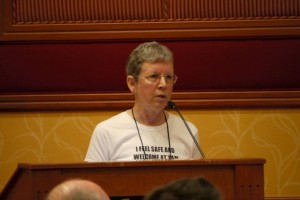I’ve been wondering what Richard Dawkins thinks of Paula Kirby’s salvo against the Sisterhood of the Oppressed and the Approved Male Chorus. I expect a lot of people have, seeing as how she’s the executive director of RDF-UK. I’m sure we’ll never know, in the sense of being told in so many words. But possibly there are hints…he did a tweet today quoting and endorsing praise of Paula’s Washington Post blog post from last year, Religion lies about women. I RTd it with a “Ditto.” I liked (and posted about, and wished I’d written) that article last year, and I still do.
But I don’t see any RTs of the salvo against the Sisterhood of the Oppressed. That’s possibly a hint. Or it’s possibly just discretion and a disinclination to spit in the faces of friends and allies, such as the people who run CFI and the people who were speakers at the conference and attended the conference. But then…if it’s that, it is in fact a tacit opinion of Paula’s salvo, because Paula’s salvo conspicuously spits in the faces of all those friends and allies. Consider some of them – Margaret Downey, Annie Laurie Gaylor, Wafa Sultan, Susan Jacoby, Jennifer Michael Hecht…You can see how Richard wouldn’t want to insult them by calling them the Sisterhood of the Oppressed, or his many friends and allies at CFI who organized and hosted the conference by jeering at the whole idea.
Anyway, that article. Take a passage from the article -
In the eyes of the Abrahamic religions, the archetypal woman is Eve: disobedient, unreliable, easily led astray, and a seductive temptress of man – man being more noble, yet easy prey to the wiles and seductions of his weaker mate. Woman is the source of danger, the one who corrupts him, the conduit for all that is evil in the world. She is dangerous … yet irresistible; and this very irresistibility makes her more dangerous still. But you will notice that the dangers of sexual temptation are not to be faced equally by men and women: no, religion demands that it is the woman who bears the burden. Solomon, we are told, had 700 wives and 300 concubines, and David had a more modest yet still energy-sapping five wives and 10 concubines, yet neither of these has become a by-word for male insatiability. Jezebel, on the other hand, has become synonymous with sexual excess, despite this not being among the vices attributed to her in the bible story.
Indeed. And? What about it? Why criticize it? Aren’t we supposed to ignore all that and just focus on being strong and determined ourselves? From the salvo:
I did a sociology module as part of my degree many years ago: I know the arguments about socialization and normative values, and structural discrimination and all that malarkey. All I can say in response is that, while all these things may be true to a greater or lesser extent, banging on about them does not even begin to help women achieve their goals. If we, as women, externalize the reasons why we are not being heard as much as we say we’d like to be, and seek to put the blame on other people, nothing is going to change or, at the very best, it is only going to change painfully slowly. It is a simple fact of life that it is always easier to change our own behaviour than to persuade other people to change theirs.
So why bang on about religion? Why bang on about the Abrahamic religions and their view of the archetypal woman? If it does not even begin to help women achieve their goals, as Paula claims, then why did she trouble to write that article?
So there is an alternative, and it is this alternative that I would urge women to seize with both hands – whether we’re talking about how we interact in our jobs, in our social lives or in the atheist movement. And that alternative is to take responsibility for ourselves and our own success. To view ourselves as mature, capable adults who can take things in our stride, and can speak up appropriately. To really start believing that we can do whatever men can do. To stop seizing on excuses for staying quiet and submissive, stop blaming it on men or hierarchies or misogyny or, silliest of all, “privilege”, and start simply practising being more assertive.
You could re-write that last sentence to say “To stop seizing on excuses for staying quiet and submissive, stop blaming it on men or hierarchies or misogyny or Abrahamic religions or, silliest of all, “privilege”, and start simply practising being more assertive.” Why would the added item to stop blaming it on be out of place? It seems to me to fit perfectly well. If Paula thought then that it was worth saying how religion described women and what it told them to do, why does she now think it’s a big mistake to say that? I would seriously like to know.
In truth I have a very hard time even understanding the thinking in that passage. The idea that social and cultural factors just don’t matter, or that even if they matter it’s much better to ignore them and simply push harder – I can’t think my way into it. It seems like thinking breathing doesn’t matter. We live in the world, we’re embedded in the world, everything we have and do and think about is part of the world. We can’t just detach from it and do everything in glorious isolation.
I’m practicing being more assertive when I say that.


(This is a syndicated post. Read the original at FreeThoughtBlogs.)



